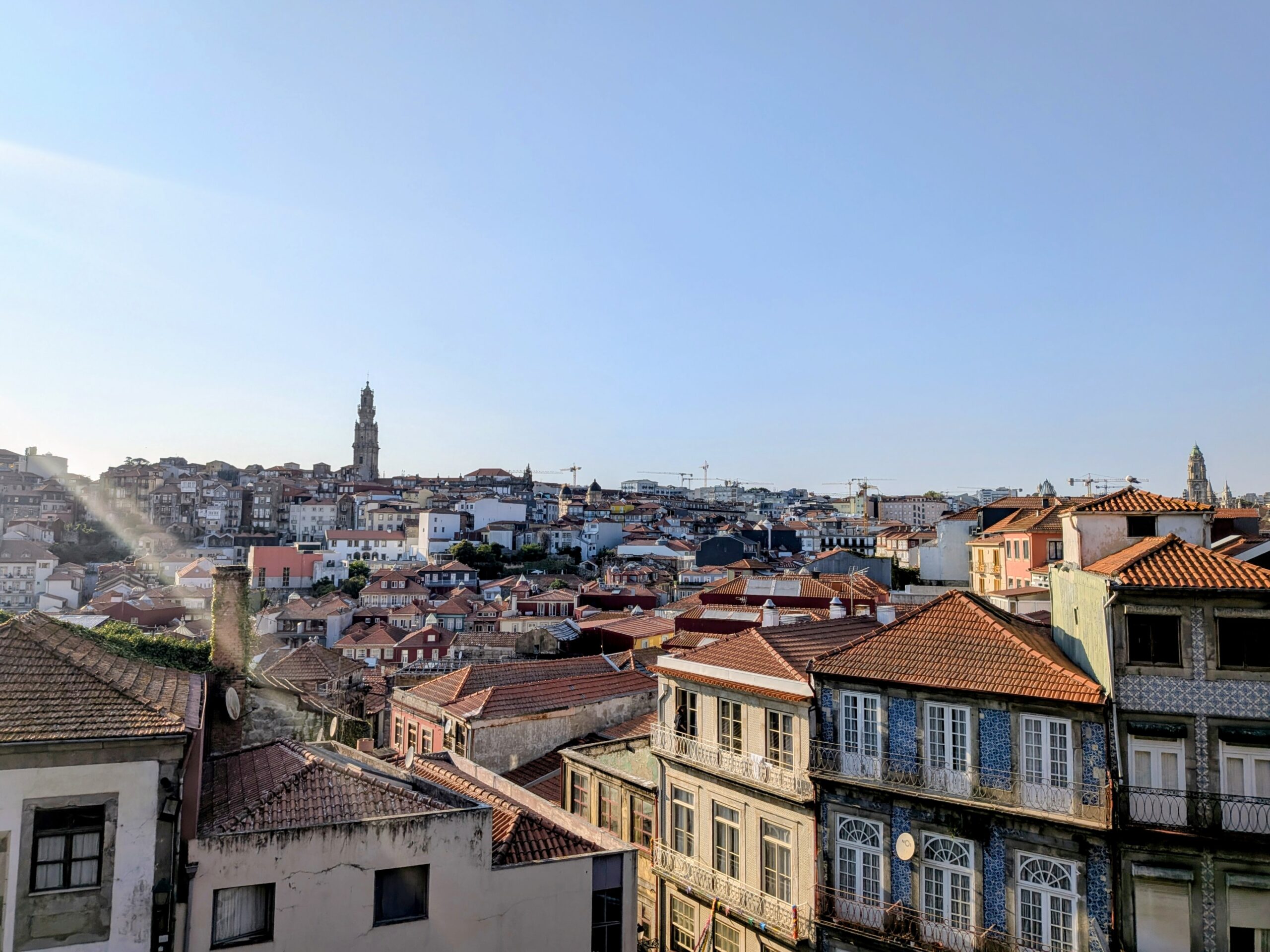Porto for Digital Nomads: Complete Guide (2025)
Disclaimer: This post may contain affiliate links, which means I may earn a small commission if you make a purchase at no additional cost to you. I only recommend products and services that I would use myself and all opinions expressed here are my own. You can read my full privacy policy here.
Quick Answer
Porto is excellent for digital nomads staying 1-2 months but challenging for longer stays. WiFi is reliable, cafes are laptop-friendly (except weekends at some spots), cost of living is affordable (1,500-2,200 euros/month including rent), and the city is safe and walkable. Best neighborhoods: Bonfim for value and space, North Baixa for local vibes and cafes. Challenge: finding good vegetarian food when dining with non-vegetarians. Stay in May-June or September for better cafe availability and lower costs.
I spent five weeks working remotely in Porto as a digital nomad. I tested cafes, worked from different neighborhoods, dealt with Portuguese bureaucracy, and learned what actually works (and what does not) for remote workers in Porto.
About This Guide
I visited Porto for 5 weeks in August 2025 (my third visit), working full-time remotely while staying in four different neighborhoods. This guide is based on actual experience working from Porto, not theoretical advice.
Table of Contents
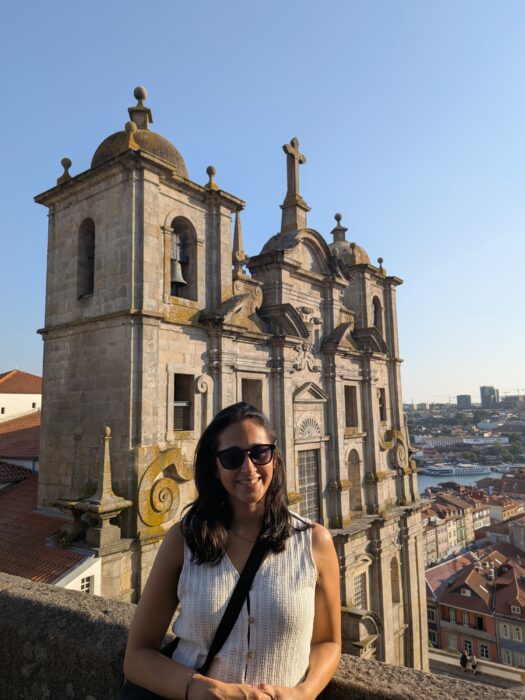
Why Porto Works for Digital Nomads
Affordable compared to Western Europe: Porto costs significantly less than Lisbon, Barcelona, London, or Paris. You can live comfortably for 1,500-2,200 euros per month including rent, food, and activities.
Reliable internet: WiFi in cafes and accommodations is generally good. I had zero issues with video calls or large file uploads during my entire stay.
Safe and walkable: Porto is extremely safe. I walked everywhere at all hours and never felt unsafe. The city is compact and pedestrian-friendly.
Good weather (most of the year): Mild winters, warm summers, lots of sunshine. Much better weather than Northern Europe.
Vibrant but not overwhelming: Porto has energy and culture without the chaos of larger cities. You can work, explore, and still have quiet time.
English widely spoken: Especially in cafes, restaurants, and shops that cater to tourists and expats. You can survive without Portuguese, though learning basics helps.
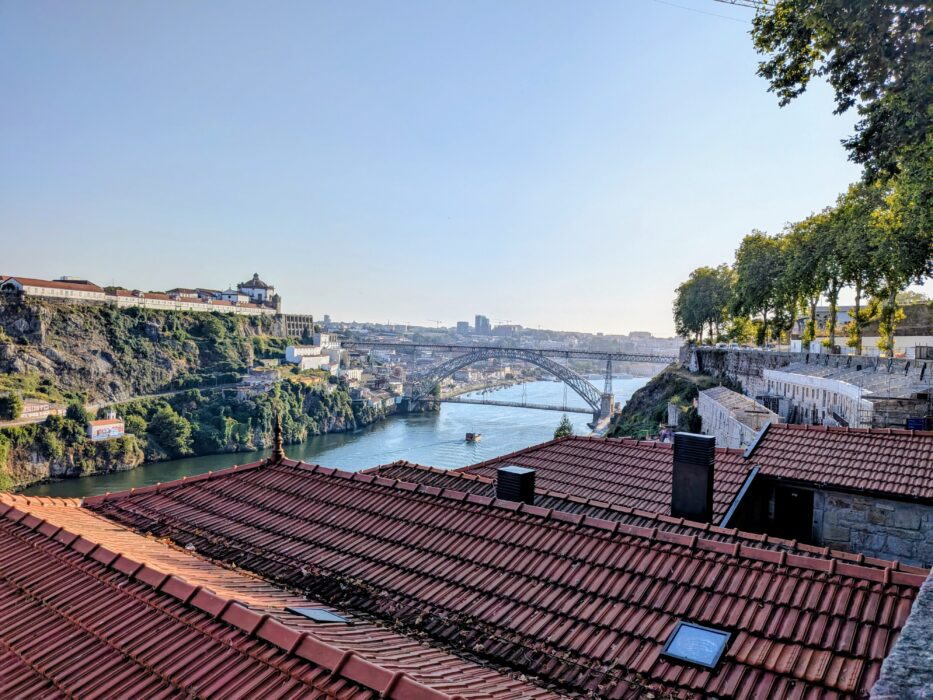
Why Porto Has Challenges for Digital Nomads
Visa bureaucracy: Portugal’s digital nomad visa exists but the application process is slow and paperwork-heavy. Many nomads enter on 90-day tourist visas instead.
Limited long-term stays: Finding accommodation for 3+ months is harder than 1-2 month rentals. Landlords prefer short-term tourist rentals or year-long leases.
Cafe culture not designed for all-day workers: Some cafes ban laptops on weekends. Others have time limits during peak hours. It is not as laptop-friendly as Lisbon or Barcelona.
Vegetarian dining challenges: If you are vegetarian (like me) and dining with non-vegetarians, finding restaurants with excellent options for both is genuinely difficult. Most places specialize in seafood OR vegetarian, rarely both.
August is tough: Peak tourist season makes cafes crowded, prices high, and finding quiet work spots difficult. Better months exist.
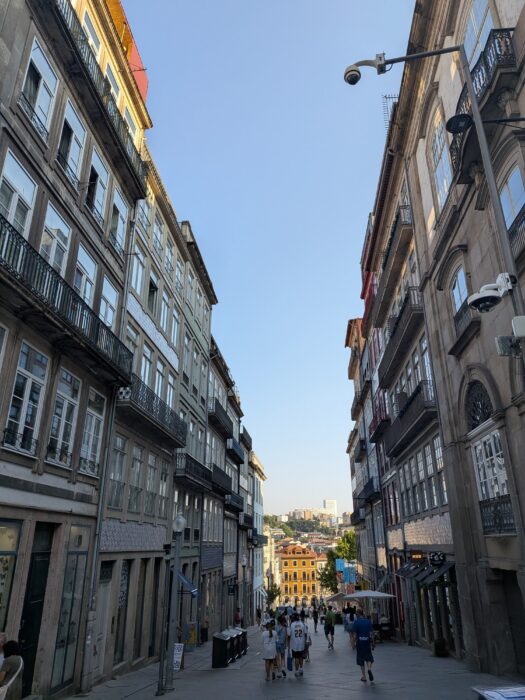
Best Neighborhoods for Digital Nomads
Bonfim (Heroísmo Area) – Best for Value ⭐
I stayed in Bonfim for 10 days and it was my favorite Porto neighborhood. More space, better prices, quieter streets, and actual local life.
Why it works for digital nomads:
- Apartments are 20-30% cheaper than Baixa for more space
- Many have terraces or outdoor areas (great for calls and breaks)
- Quiet enough to focus and take video calls without street noise
- Proper supermarkets nearby (Pingo Doce, Continente) for cooking/meal prep
- Local cafes less crowded than tourist areas
- 20-minute walk to city center (or quick metro ride)
Challenges:
- Steep hills (brutal climb back from river – I am fit and had to stop halfway)
- Fewer cafes within immediate walking distance
- Further from tourist sights (but you are working, not sightseeing daily)
Cost: 600-900 euros/month for 1-bedroom apartment with outdoor space
Best for: Budget-conscious nomads, people who want quiet workspace at home, stays of 2+ weeks
Best Accommodation for Digital Nomads in Bonfim
- Charming Bonfim Penthouse – 75-95 euros/night
– 4.8/5 – 3 bedrooms, balcony, fireplace, spacious, good for groups or long stays - Bonfim Perfect Stays – 55-75 euros/night
– 4.4/5 – 2 bedrooms, dining area, good WiFi, local neighborhood, affordable - Smartr Porto Bonfim – 50-70 euros/night
– 4.7/5 – Modern, 16-min walk to Sao Bento, affordable, quiet, good for remote work
North Baixa (Near Praça República) – Best for Local Vibes ⭐
This was probably the most authentically local area I stayed in Porto. Great cafes, less touristy, more affordable than central Baixa, but still walkable to everything.
Why it works for digital nomads:
- Excellent cafe density (Combi Coffee, Honest Greens, local spots)
- Quieter than central Baixa but still central
- Good restaurants with local prices
- Supermarkets accessible
- Authentic Porto neighborhood feel
Challenges:
- Still more expensive than Bonfim
- Cafes can fill up (though less than central Baixa)
Cost: 800-1,200 euros/month for 1-bedroom
Best for: Nomads who want walkability plus local atmosphere, cafe workers
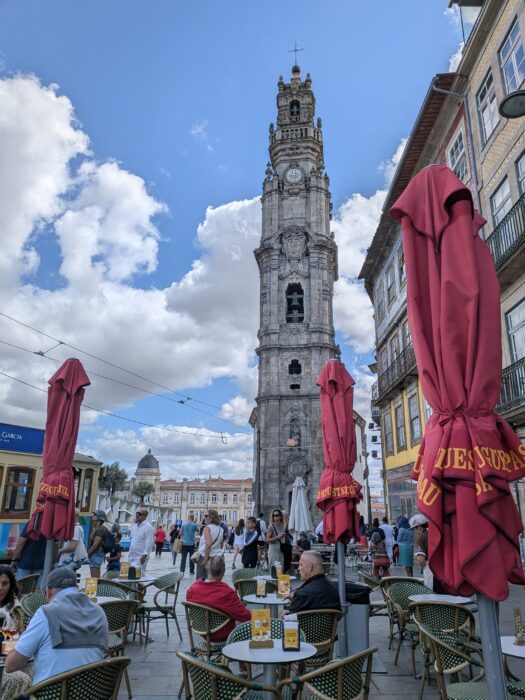
Central Baixa – Convenient but Challenging
I stayed near Clérigos Tower for two weeks. Maximum convenience, but it came with serious trade-offs for remote work.
Pros:
- Walk to everything in under 15 minutes
- Many cafe options
- Easy for after-work exploring
Cons for digital nomads:
- Loud until midnight (impossible to take evening calls)
- Cramped apartments for the price
- Cafes crowded with tourists
- Expensive (900-1,500 euros/month for small 1-bedroom)
Skip unless: You prioritize location over everything else and can afford the premium
Best Cafes to Work From in Porto
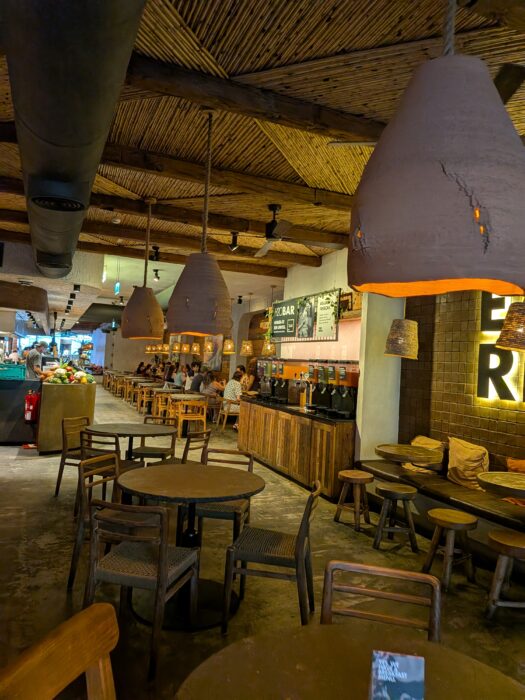
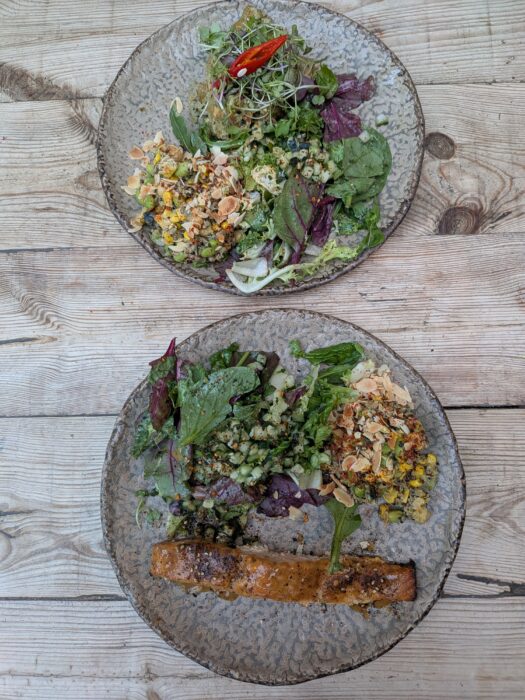
Honest Greens – Best All-Day Workspace ⭐
Two locations in Porto. This became my go-to workspace. Healthy food joint with excellent salad bowls and some of the best tofu I have ever had.
Why it works for remote work:
- Huge space – always find a table even when busy
- Covered outdoor area in back (quieter, good for calls)
- Reliable WiFi and plenty of outlets
- Self-serve so no pressure to order constantly
- Good food if you are there for hours (salads, salmon, tofu)
- Separate coffee bar at front
Laptop policy: Allowed all days
Best for: All-day work sessions, calls (in back area), lunch while working
Cost: 3-4 euros coffee, 10-15 euros food

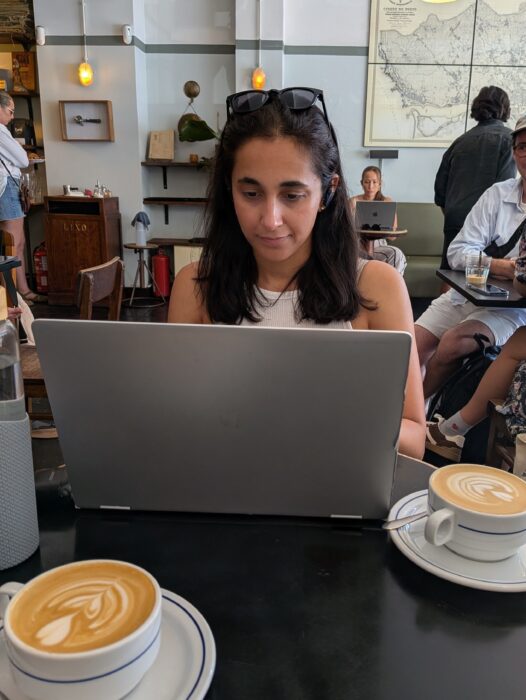
Combi Coffee Roasters – Best Coffee, Weekday Only ⭐
Excellent flat whites (coming from Australia/New Zealand, we are spoiled for good coffee – these lived up to standards). Popular with locals who work here for hours.
Why it works:
- Good coffee (actually good, not just acceptable)
- Reliable WiFi and outlets
- Dedicated laptop tables weekdays
- Good atmosphere for focused work
Laptop policy: Allowed weekdays, NO LAPTOPS WEEKENDS
Challenges:
- Gets very busy – arrive early for good table
- Not ideal for calls (too busy/noisy)
- Weekend ban means you need backup options
Best for: Weekday morning/afternoon work, good coffee, focused deep work (not calls)
Cost: 2.50-3.50 euros for coffee

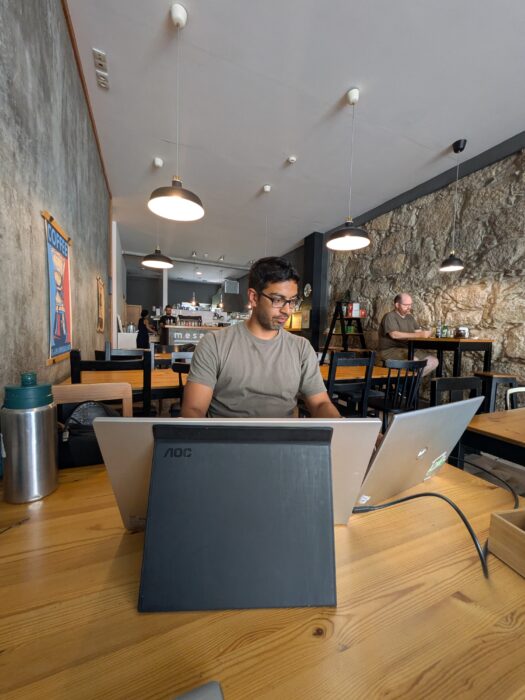
Mesa – Laptop-Friendly All Week ⭐
We came here straight from the airport when our accommodation was not ready for check-in. Staff let us park suitcases in a corner. Service was quick and attentive.
Why it works:
- Laptop-friendly all days including weekends
- Good coffee and food (granola bowl was excellent)
- Tables big enough for laptop work
- Charging points available
- Never too crowded to get work done
Best for: Reliable workspace any day of week, morning work sessions
Cost: 3-4 euros coffee, 8-12 euros food
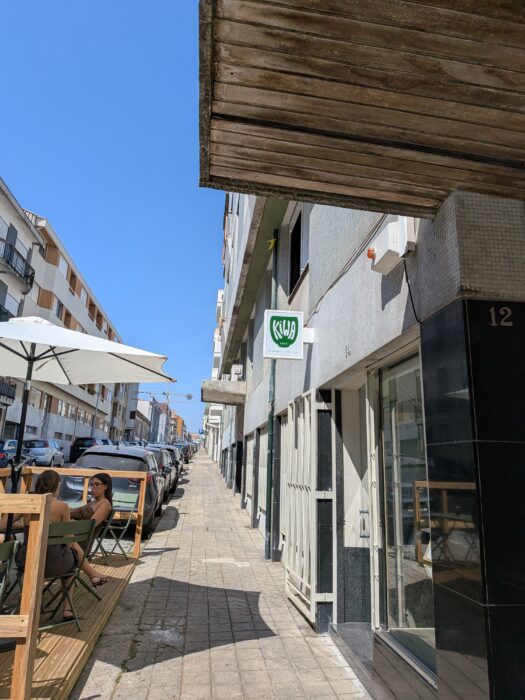
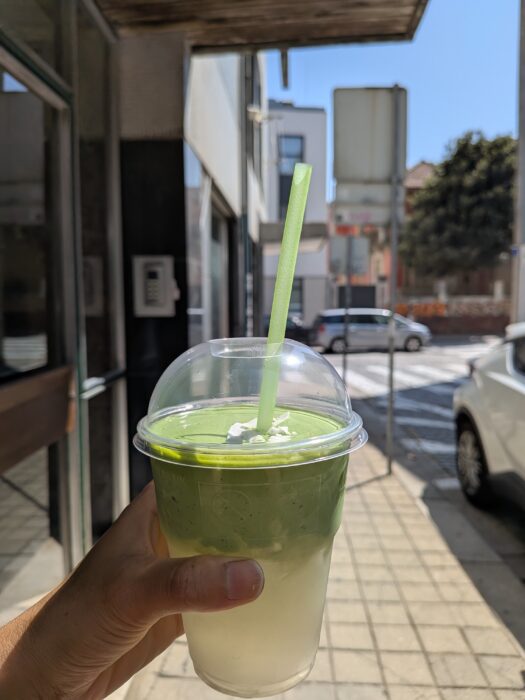
Kiwa – Best for Matcha Lovers ⭐
I had been wanting to try this place after seeing they do good iced matcha – hard to find in Portugal. The matcha basque cheesecake was sadly sold out when I went.
Why it works:
- Quiet, not overly crowded
- Good for focused work
- Iced matcha (rare in Porto)
- Looked very laptop-friendly though I only did takeaway
Best for: Quiet work environment, matcha drinks
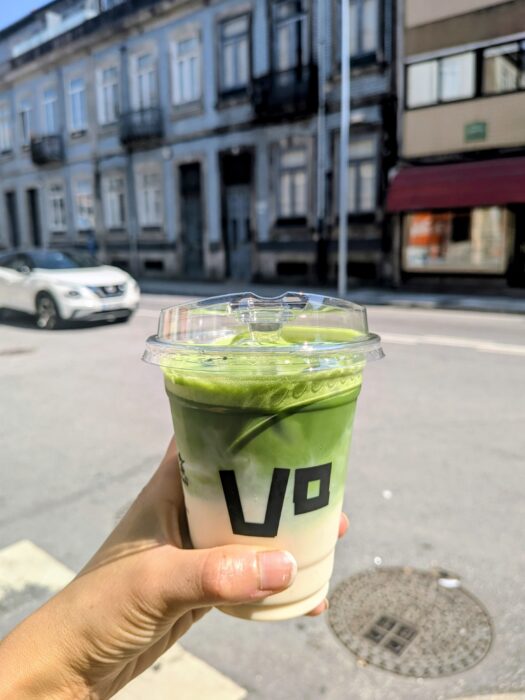

Von and Vinnie Microroasters
Known for good coffee. Nice and airy inside with decent table space. I got iced matcha here (prepared differently than I am used to in London but acceptable).
Laptop policy: Allowed
Best for: Afternoon work sessions, good coffee
For more cafe details, read my full guide to Porto work cafes.
Pro Tip
Work mornings (7am-12pm) then explore afternoons/evenings. Porto is too beautiful to sit in cafes all day. Front-load your work hours and enjoy the city when you are done. Late sunsets in summer mean you have until 9pm with natural light.
Internet & Connectivity
Accommodation WiFi: Generally excellent. All four places I stayed had reliable, fast internet suitable for video calls and large file uploads. Always ask for WiFi speed before booking if internet is critical.
Cafe WiFi: Reliable at the cafes I mentioned. Honest Greens, Combi, Mesa all had good enough WiFi for work. Avoid relying on cafe WiFi for critical calls though – have backup options.
Mobile data: I used Airalo eSIM (5GB for 6 euros, valid 7 days). Fast, reliable, worked perfectly throughout Porto. Essential for Google Maps, restaurant bookings, and backup internet.
Coworking spaces: Porto has several coworking spaces but I never used them. Cafe WiFi and accommodation internet were sufficient. If you need dedicated desk space or professional meeting rooms, check out Second Home Porto or Selina Porto.
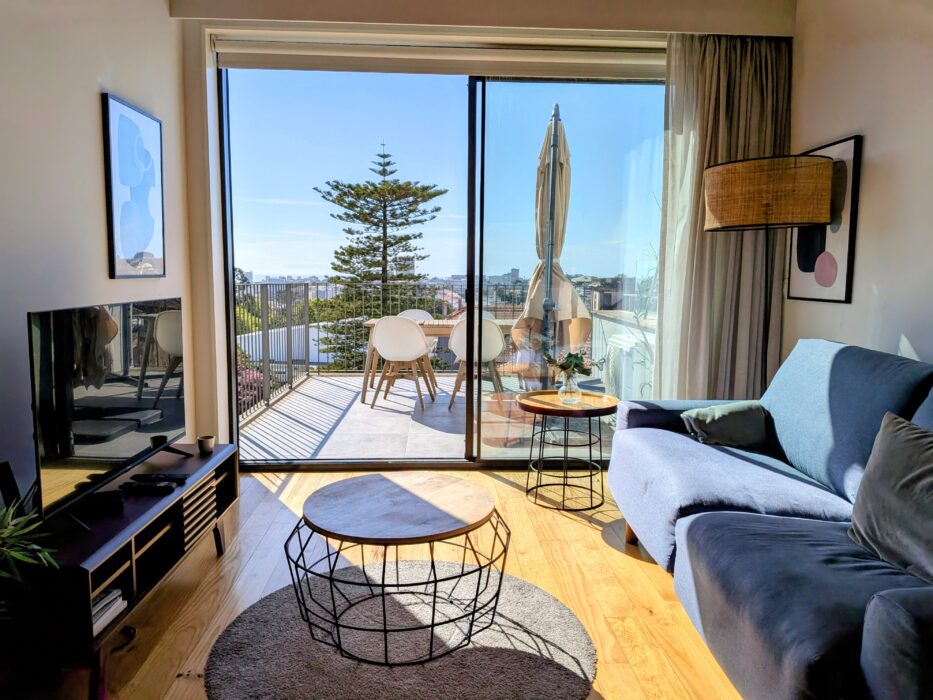
Cost of Living Breakdown (August 2025)
My actual monthly costs as digital nomad:
Accommodation: 2,250 euros total for 5 weeks = approximately 1,950 euros/month averaged
- Baixa: 95 euros/night
- Bonfim: 65 euros/night
- North Baixa: 75 euros/night
- Peak August pricing – shoulder season would be 20-30% less
Food: 1,200 euros/month (40 euros/day)
- Breakfast from supermarket: 3-5 euros
- Lunch: 12-18 euros (restaurant or cafe)
- Dinner: 20-30 euros
- Coffee/cafe working: 5-8 euros
Transport: 20 euros/month (Porto is very walkable, minimal metro use)
Activities/Entertainment: 300 euros/month (Douro tour, port tastings, occasional experiences)
Work expenses: 150 euros/month (cafe coffees, eSIM data, coworking day passes if needed)
Total: 3,620 euros/month
This is comfortable mid-range living with good accommodation, eating out most meals, and doing tourist activities. Not budget but not luxury.
How to spend less (Budget DN version):
- Accommodation in Bonfim: 650 euros/month (negotiate monthly rate)
- Cook most meals: 300 euros/month groceries
- Eat out 2-3x week: 200 euros/month
- Work from home mostly: 50 euros/month cafe budget
- Minimal activities: 100 euros/month
- Budget total: 1,500-1,700 euros/month
Porto is very affordable for digital nomads compared to other Western European cities. Lisbon costs 30-40% more. London or Paris cost double or triple.
For detailed budget, read my full Porto cost breakdown.
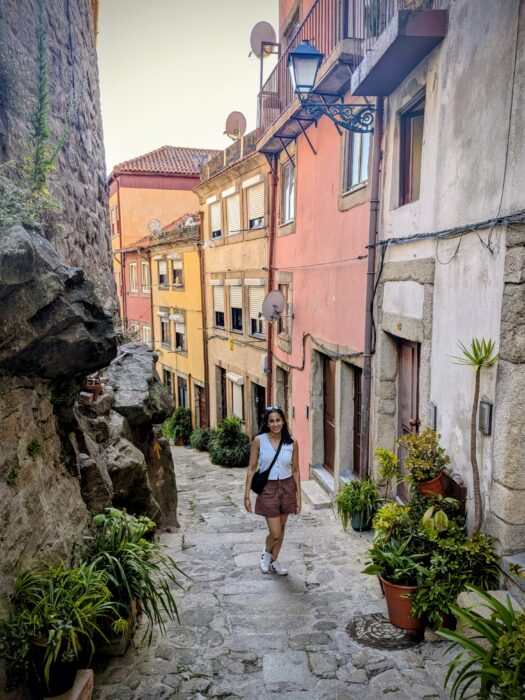
Best Time to Visit Porto as Digital Nomad
May-June (Ideal) ⭐
- Pleasant weather (20-24°C)
- Fewer tourists = available cafes
- 20-30% cheaper accommodation
- Still long daylight hours
- Easier to find monthly rentals
September-October (Also Excellent) ⭐
- Post-summer prices drop
- Still warm (22-26°C)
- Fewer crowds
- Cafes less packed
- Harvest season in Douro Valley
November-March (Cheapest but Tradeoffs)
- Much cheaper (30-40% less than peak)
- Minimal tourists
- Cooler and rainier (15-18°C)
- Shorter days (dark by 6pm)
- Some attractions reduced hours
July-August (Challenging)
- Peak prices
- Crowded cafes
- Hard to find work tables on weekends
- Noise in central neighborhoods
- Beautiful weather but not ideal for productivity
I visited in August and made it work, but May-June or September would be objectively better for digital nomads.
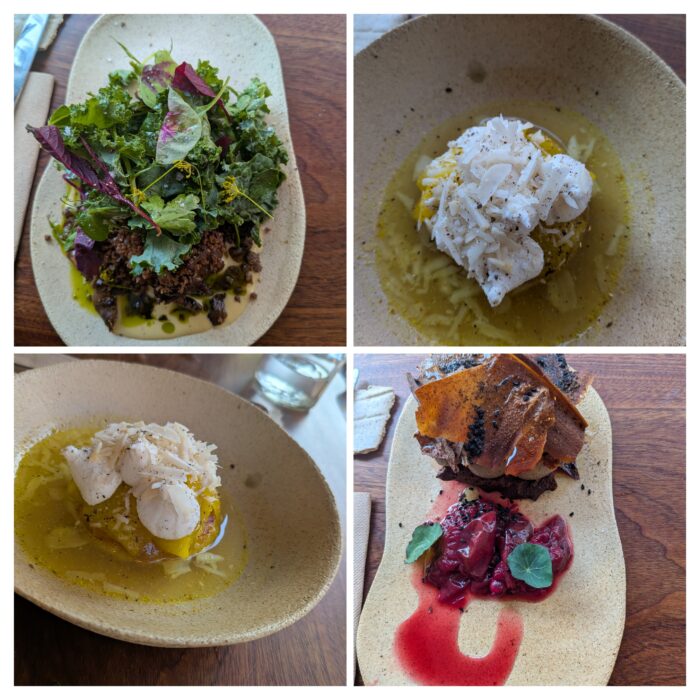
Vegetarian Food Challenges
This deserves its own section because it was genuinely my biggest Porto frustration as a mostly vegetarian person.
The problem: Porto restaurants specialize. Either they do excellent seafood with mediocre vegetarian options, or they do excellent vegetarian food with no seafood. Finding restaurants with truly good options for both is rare.
When I was dining with my non-vegetarian partner or visiting friends, we constantly struggled to find places where both of us could eat well.
Exceptions (restaurants good for both):
- Bilha Nova: Legitimately excellent mushroom risotto AND great seafood. Rare.
- Muro do Bacalhau: Good vegetable dishes alongside seafood.
- Honest Greens: Has salmon plus excellent vegetarian/vegan options.
- Timeout Market: Food court model means everyone finds something.
Dedicated vegetarian spots:
- Venn Canteen (vegan fine dining)
- daTerra (elevated vegetarian)
- Cult of Pita (fast casual)
For full vegetarian guide, read my best vegetarian restaurants in Porto.
Visa & Bureaucracy
90-day tourist visa: Most digital nomads from US, UK, Australia, Canada, etc. enter Portugal on 90-day tourist visas (Schengen). No application required – you get stamped in at the airport.
Portugal digital nomad visa: Exists but requires proving remote income, health insurance, criminal background check, and navigating Portuguese bureaucracy. Processing takes 2-3 months. Many nomads skip this for short stays.
Tax residency: If you stay in Portugal more than 183 days in a year, you become tax resident. Consult tax advisor if planning long stays.
NIF (tax number): You need this to rent long-term apartments, get SIM cards, or open bank accounts. Can obtain at local tax office (Finanças) with passport and proof of address. Process takes 1-2 hours.
Reality: For 1-2 month stays, most nomads just use tourist visa, book short-term rentals, and use eSIM for mobile data. It works fine.
Healthcare & Insurance
Public healthcare: Portugal has good public healthcare but tourists/nomads typically use private care or travel insurance.
Private clinics: Available and affordable. Consultations cost 40-80 euros. Much cheaper than US, similar to UK private.
Pharmacies: Well-stocked, pharmacists speak English, many medications available over counter that require prescriptions elsewhere.
Travel insurance: Essential. I use EKTA for European coverage. Get insurance that covers medical care, emergency evacuation, and electronics (laptop is your livelihood as DN).
Safety & Quality of Life
Safety: Porto is very safe. I walked everywhere at all hours, worked in cafes with laptop out, never felt unsafe. Normal city precautions apply (watch belongings in crowded areas) but Porto feels genuinely safe.
English proficiency: High in cafes, restaurants, tourist areas. Lower in residential neighborhoods and with older Portuguese people. You can function fine with English only.
Expat community: Growing but not overwhelming. You will meet other digital nomads in coworking spaces and popular cafes. Easier to make friends than in non-nomad cities.
Social life: Easy to meet people. Join walking tours, attend MeetUp events, chat with people in cafes. Portuguese people are friendly, especially to foreigners making effort to speak Portuguese.
Dating scene: Active on apps (Tinder, Bumble, Hinge). Many young Portuguese professionals and international expats/nomads.
Practical Digital Nomad Tips
Get accommodation with workspace: Dedicated desk, good chair, natural light. You will spend hours working – do not underestimate workspace importance.
Test noise levels before booking: Baixa and Ribeira are loud until midnight. Read reviews mentioning noise. Ask hosts directly.
Negotiate monthly rates: Booking weekly rates for a month is expensive. Contact hosts directly and negotiate monthly discount (often 20-30% off).
Join Facebook groups: “Digital Nomads Porto,” “Expats in Porto,” “Porto International Community” – good for advice, meetups, apartment leads.
Learn basic Portuguese: You can survive with English but learning basics (obrigado/a, por favor, bom dia, quanto custa) makes life much easier and locals appreciate effort.
Get NIF early if staying 2+ months: Makes everything easier – banking, long-term rentals, contracts.
Have backup work locations: Do not rely on single cafe. Have 3-4 backup options for different work needs (calls, deep work, all-day sessions).
Money Saver
Buy breakfast/lunch supplies from Pingo Doce or Continente instead of eating out every meal. Saves 15-20 euros daily. Fresh bread, cheese, fruit, yogurt – all cheap and good quality. Eat out for dinner when you want social atmosphere.
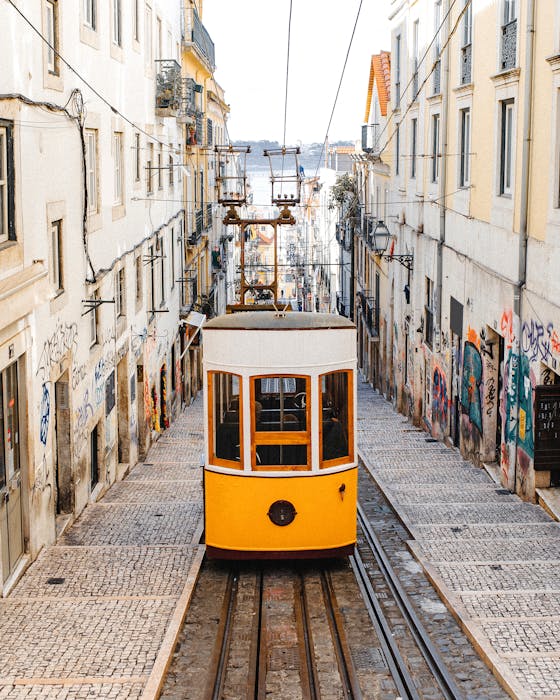
Porto vs Lisbon for Digital Nomads
Porto wins on:
- Cost (30-40% cheaper than Lisbon)
- Walkability (smaller, easier to navigate)
- Less crowded
- More authentic Portuguese feel
- Better value for accommodation size/quality
Lisbon wins on:
- Larger coworking scene
- Bigger digital nomad community
- More international dining options
- Better international connections (airport)
- More networking/professional opportunities
- Warmer in winter
My take: Porto for 1-2 months is perfect. Affordable, beautiful, productive. Lisbon for 3+ months makes more sense – bigger community, more long-term infrastructure. Or do both – split your Portugal stay between cities.
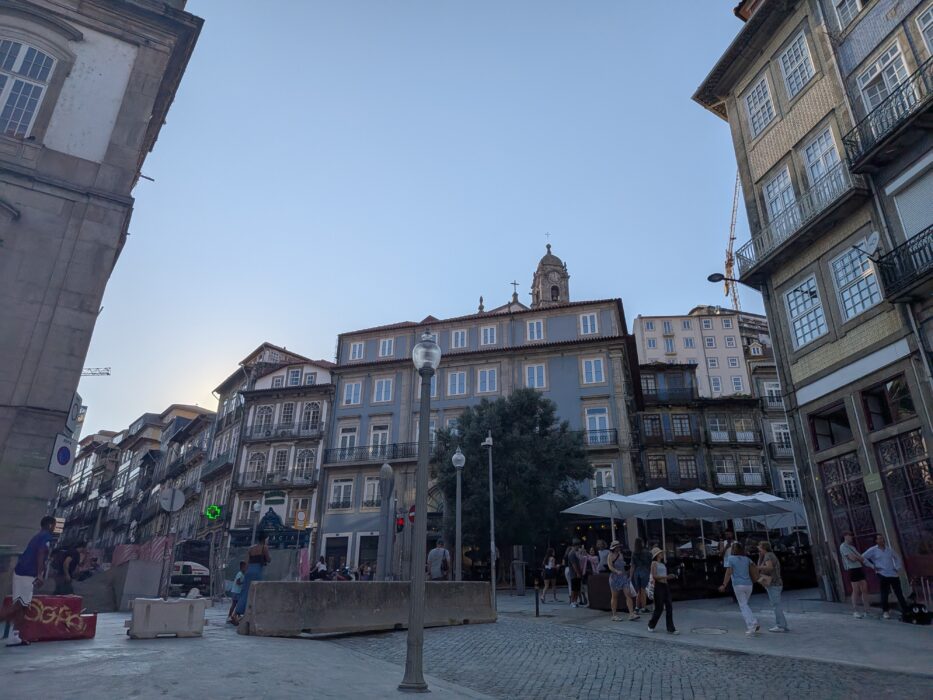
Final Verdict: Should You Choose Porto?
Porto is excellent for digital nomads if:
- You are staying 1-2 months (not 6+ months)
- You want affordable Western Europe
- You value walkability and smaller city feel
- You can work from home/apartment comfortably
- You visit in shoulder season (May-June or September)
Skip Porto if:
- You need large coworking/nomad community
- You want year-round warm weather
- You rely heavily on working from cafes daily
- You are strictly vegetarian and eat out most meals
- You are staying 6+ months (Lisbon better for long term)
I loved my five weeks working remotely in Porto. The city is beautiful, affordable, safe, and offers excellent quality of life. Internet is reliable, cafes are welcoming (mostly), and the balance between work and exploration is perfect.
Would I go back as a digital nomad? Absolutely. But next time, I would visit in May or September instead of August, stay in Bonfim for the value and quiet workspace, and plan my stay for 4-6 weeks maximum.
Digital Nomad Essentials for Porto
- Bonfim Apartment with Workspace – 55-75 euros/night
– 4.4/5 – 2 bedrooms, dining area, quiet for work, negotiate monthly rate - Airalo eSIM Portugal – 6 euros for 5GB
– Fast reliable data, works perfectly in Porto, essential for nomads - Weekend Douro Valley Tour – 89 euros
– 4.7/5 – Take a break from work, full-day experience, book for Saturday/Sunday
Related Porto Guides
- Porto Travel Guide: 5 Weeks Living in Portugal
- Where to Stay in Porto: 5 Best Neighborhoods
- Porto Work Cafes: 10 Best for Digital Nomads
- Porto on a Budget: What 5 Weeks Cost
- Best Vegetarian Restaurants in Porto
- Best Restaurants in Porto
- Porto in August
Last Updated: November 2025

